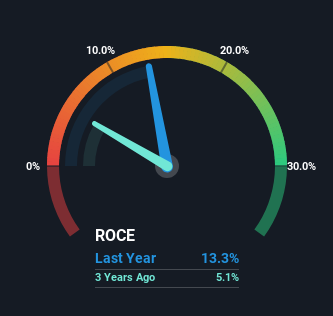- United States
- /
- Professional Services
- /
- NasdaqGS:HURN
We Like These Underlying Return On Capital Trends At Huron Consulting Group (NASDAQ:HURN)
If you're looking for a multi-bagger, there's a few things to keep an eye out for. One common approach is to try and find a company with returns on capital employed (ROCE) that are increasing, in conjunction with a growing amount of capital employed. This shows us that it's a compounding machine, able to continually reinvest its earnings back into the business and generate higher returns. So on that note, Huron Consulting Group (NASDAQ:HURN) looks quite promising in regards to its trends of return on capital.
What Is Return On Capital Employed (ROCE)?
Just to clarify if you're unsure, ROCE is a metric for evaluating how much pre-tax income (in percentage terms) a company earns on the capital invested in its business. Analysts use this formula to calculate it for Huron Consulting Group:
Return on Capital Employed = Earnings Before Interest and Tax (EBIT) ÷ (Total Assets - Current Liabilities)
0.13 = US$146m ÷ (US$1.3b - US$226m) (Based on the trailing twelve months to June 2024).
Therefore, Huron Consulting Group has an ROCE of 13%. That's a relatively normal return on capital, and it's around the 14% generated by the Professional Services industry.
Check out our latest analysis for Huron Consulting Group

Above you can see how the current ROCE for Huron Consulting Group compares to its prior returns on capital, but there's only so much you can tell from the past. If you'd like, you can check out the forecasts from the analysts covering Huron Consulting Group for free.
The Trend Of ROCE
The trends we've noticed at Huron Consulting Group are quite reassuring. The data shows that returns on capital have increased substantially over the last five years to 13%. The amount of capital employed has increased too, by 53%. So we're very much inspired by what we're seeing at Huron Consulting Group thanks to its ability to profitably reinvest capital.
In another part of our analysis, we noticed that the company's ratio of current liabilities to total assets decreased to 17%, which broadly means the business is relying less on its suppliers or short-term creditors to fund its operations. Therefore we can rest assured that the growth in ROCE is a result of the business' fundamental improvements, rather than a cooking class featuring this company's books.
The Key Takeaway
All in all, it's terrific to see that Huron Consulting Group is reaping the rewards from prior investments and is growing its capital base. And investors seem to expect more of this going forward, since the stock has rewarded shareholders with a 75% return over the last five years. Therefore, we think it would be worth your time to check if these trends are going to continue.
Huron Consulting Group does have some risks though, and we've spotted 3 warning signs for Huron Consulting Group that you might be interested in.
While Huron Consulting Group isn't earning the highest return, check out this free list of companies that are earning high returns on equity with solid balance sheets.
Valuation is complex, but we're here to simplify it.
Discover if Huron Consulting Group might be undervalued or overvalued with our detailed analysis, featuring fair value estimates, potential risks, dividends, insider trades, and its financial condition.
Access Free AnalysisHave feedback on this article? Concerned about the content? Get in touch with us directly. Alternatively, email editorial-team (at) simplywallst.com.
This article by Simply Wall St is general in nature. We provide commentary based on historical data and analyst forecasts only using an unbiased methodology and our articles are not intended to be financial advice. It does not constitute a recommendation to buy or sell any stock, and does not take account of your objectives, or your financial situation. We aim to bring you long-term focused analysis driven by fundamental data. Note that our analysis may not factor in the latest price-sensitive company announcements or qualitative material. Simply Wall St has no position in any stocks mentioned.
About NasdaqGS:HURN
Huron Consulting Group
Provides consultancy and managed services in the United States and internationally.
Undervalued with proven track record.
Similar Companies
Market Insights
Community Narratives



